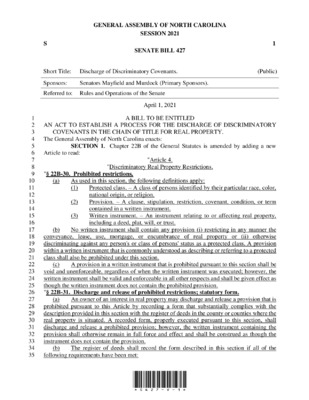Removing Racially Restrictive Covenants
While racially restrictive covenants may seem like an issue left in history, they remain in property deeds across the United States in the twenty-first century. In most instances, these restrictive covenants are considered unenforceable. Although the Supreme Court ruled the covenants unenforceable in 1948 and the 1968 Fair Housing Act outlawed them, this does not stop the lingering racism from affecting potential homeowners.
Why is it so important to remove or provide legal clarity for something that cannot be enforced?
As the NAACP president of Baltimore, Kobi Little once said, “Now that discriminatory covenants are illegal, remove them. It’s like saying, now that the ‘White Only’ signs are illegal, remove them.”
There is no need for discriminatory language to continue in legal documentation unless language is also added thoroughly denouncing those sections as illegal. These restrictive covenants reveal a history of systemic racism in the United States, which perpetuates deeply rooted issues.
How can one remove these restrictions from their property or local property deeds in their community?
The answer to this question requires time and, occasionally, money, but it is imperative communities remove these restrictive covenants. For decades, people have overlooked the work needed to remove these covenants, likely due to the idea that such covenants are unenforceable and have no legal effect on the purchaser. However, covenants are a shadow that lingers among its communities, though not physical or material, in the sense that they can bar non-whites from owning. Why would someone want to purchase a property with this in the deed, even if they can? Local ordinances in each state have different processes for removing and amending restrictive covenants within property deeds. Many state officials choose not to remove racist language because they do not want to erase a covenant from public record and instead choose to attach a piece of paper disavowing the language.
In North Carolina, there are two properties with specific requirements for homeowners and community members to remove restrictive covenants: subdivisions and condominiums. Subdivisions require time and organization from community members to remove restrictive covenants. The North Carolina General Statutes (NCGS) require affirmative action through a vote, meaning property owners must remove covenants from deeds.
“the declaration may be amended only by the affirmative vote or written agreement signed by lot owners of lots to which at least sixty-seven percent (67%) of the votes in the association are allocated, or any larger majority the declaration specifiers or by the declarant if necessary for the exercise of any development right. The declaration may specify a smaller number only if all of the lots are restricted exclusively to nonresidential use.”
Condominium amendments are similar to amending in subdivisions, relying on a 67% majority vote. However, condominium unit owners can appeal to a superior court to have covenants and, in other cases, mistakes struck out or fixed within the deed. Chapter 47C from the NCGS states:
“A unit owners' association may bring a civil action in superior court in the county where the condominium or the greater part thereof is located to reform the condominium instruments to resolve ambiguities, errors, or inconsistencies in the condominium instruments that are the source of legal and other disputes about the legal rights and responsibilities of the unit owners' association or individual unit owners.”
Regarding other properties, there are not much property owners can do besides applying for appeals to remove these covenants. In April of 2021, North Carolina State Senators Julie Mayfield and Natalie Murdock have moved to introduce "Discharge of Discriminatory Covenants"
a bill that would take a decisive step toward removing racially restrictive covenants. The bill sets up a system and creates a documentary form in which property owners can “discharge” covenants that discriminate against the basis of sex, race, ethnicity, and religion. In the research completed thus far in Watauga County, none of the properties which listed racially restrictive covenants in the past still have those covenants in their current deeds.
In recent years, there have been suggestions of total system changes within the county offices on how to deal with ubiquitous amounts of discriminatory covenants. These options would make the process more efficient and official, rather than going through and fixing every out-of-date covenant one at a time. These suggestions come in the forms of disclaimers, destruction (and preservation) of the original deed, and formal acknowledgments that these covenants are null and void, all to prevent indirect discrimination and confusion about their existence.
In recent years, there have been suggestions of total system changes within the county offices on how to deal with ubiquitous amounts of discriminatory covenants. This argument would make the process more efficient and official, rather than going through and fixing every out-of-date covenant. These suggestions come in the forms of disclaimers, destruction (and preservation) of the original deed, and formal acknowledgments that these covenants are null and void, all to prevent indirect discrimination and confusion about their existence.
